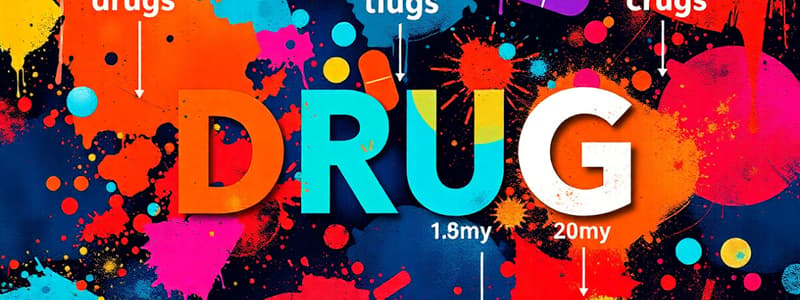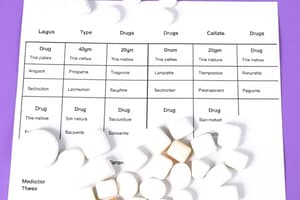Podcast
Questions and Answers
Qual é a definição correta de abuso de drogas?
Qual é a definição correta de abuso de drogas?
- Uso de drogas apenas para recreação.
- Uso responsável de medicamentos prescritos.
- Uso de drogas de forma consistente com padrões médicos.
- Uso nocivo de uma droga de maneira inconsistente com padrões médicos, sociais ou legais. (correct)
Qual destes fatores pode contribuir para o desenvolvimento do vício em drogas?
Qual destes fatores pode contribuir para o desenvolvimento do vício em drogas?
- Alimentação balanceada.
- Aumento na prática de esportes.
- Estudo acadêmico rigoroso.
- Predisposição genética. (correct)
Qual é um dos principais focos do tratamento para abuso de drogas?
Qual é um dos principais focos do tratamento para abuso de drogas?
- Desintoxicação sob supervisão médica. (correct)
- Mudança de hábitos alimentares.
- Retorno imediato ao uso de substâncias.
- Aumento da atividade recreativa.
Qual é a função dos grupos de apoio na recuperação de dependentes de drogas?
Qual é a função dos grupos de apoio na recuperação de dependentes de drogas?
Qual é um dos objetivos das iniciativas de prevenção ao abuso de drogas?
Qual é um dos objetivos das iniciativas de prevenção ao abuso de drogas?
Qual das seguintes drogas é classificada como um estimulante?
Qual das seguintes drogas é classificada como um estimulante?
Qual das opções a seguir é um depressor?
Qual das opções a seguir é um depressor?
Dentre as seguintes opções, qual é um exemplo de opiácea?
Dentre as seguintes opções, qual é um exemplo de opiácea?
Qual das seguintes drogas é considerada legal na maioria dos lugares?
Qual das seguintes drogas é considerada legal na maioria dos lugares?
Qual é uma característica das drogas sintéticas?
Qual é uma característica das drogas sintéticas?
O que caracteriza uma droga de prescrição?
O que caracteriza uma droga de prescrição?
A qual categoria pertence a psilocibina?
A qual categoria pertence a psilocibina?
Qual dos seguintes é um risco associado ao uso de drogas?
Qual dos seguintes é um risco associado ao uso de drogas?
Flashcards
Drogas Estimulantes
Drogas Estimulantes
São substâncias que aumentam a atenção, energia e frequência cardíaca.
Drogas Depressoras
Drogas Depressoras
São substâncias que diminuem a atividade do sistema nervoso central.
Drogas Alucinógenas
Drogas Alucinógenas
Alteram a percepção, os pensamentos e os sentimentos.
Drogas Opiáceas
Drogas Opiáceas
Signup and view all the flashcards
Tolerância a Drogas
Tolerância a Drogas
Signup and view all the flashcards
Abuso de Drogas
Abuso de Drogas
Signup and view all the flashcards
Sobredosagem
Sobredosagem
Signup and view all the flashcards
Dependência Química
Dependência Química
Signup and view all the flashcards
O que é abuso de drogas?
O que é abuso de drogas?
Signup and view all the flashcards
O que é dependência química?
O que é dependência química?
Signup and view all the flashcards
Fatores que podem levar à dependência
Fatores que podem levar à dependência
Signup and view all the flashcards
Desintoxicação
Desintoxicação
Signup and view all the flashcards
Tratamento para dependência química
Tratamento para dependência química
Signup and view all the flashcards
Study Notes
Types of Drugs
-
Drugs are substances that can alter the functions of the body and mind. They can have diverse effects, ranging from stimulating to depressant.
-
Several ways to categorize drugs:
- By their effect on the body and mind:
-
Stimulants: Increase alertness, energy, and heart rate. Examples: cocaine, amphetamines, caffeine.
-
Depressants: Slow down the activity of the central nervous system. Examples: alcohol, benzodiazepines, opioids.
-
Hallucinogens: Alter perception, thoughts, and feelings. Examples: LSD, psilocybin (mushrooms), PCP.
-
Opiates: Relieve pain and induce feelings of euphoria. Examples: morphine, heroin, codeine.
- By their legal status:
-
Legal: Many drugs are legal for various purposes; examples include caffeine, nicotine, and alcohol (with legal limits).
-
Illegal: Many drugs (e.g., cocaine, heroin) are illegal to possess and use, often due to health risks and potential for abuse. Their status often varies by jurisdiction.
- By their origin:
-
Natural: Derived from plants or animals. Examples include opium, cannabis.
-
Synthetic: Created in laboratories. Examples include many pharmaceutical drugs and designer drugs.
- By their classification in medicine:
-
Prescription drugs: Require a doctor's prescription. Examples: pain relievers, antibiotics, antidepressants.
-
Over-the-counter (OTC) drugs: Can be purchased without a prescription. Examples: pain relievers, cold remedies.
Drug Effects and Risks
-
Drug effects can vary greatly depending on factors such as dosage, individual physiology, and the presence of other substances.
-
Potential risks associated with drug use include:
-
Physical harm: Damage to organs (liver, kidneys), cardiovascular issues, respiratory problems.
-
Mental health issues: Depression, anxiety, psychosis, addiction.
-
Social problems: Relationship strain, unemployment, crime.
-
Overdose: Can be fatal. Signs can include slowed breathing, loss of consciousness, or seizures.
-
Addiction: A chronic disease characterized by compulsive drug-seeking behavior and use despite harmful consequences. Addiction has several components, including physical dependence and psychological dependence.
-
Tolerance: The body's adaptation to a drug, requiring higher doses to achieve the same effect.
-
Withdrawal: A set of symptoms experienced when a person stops using a drug after prolonged heavy use. These symptoms can be physically and psychologically debilitating.
Drug Abuse and Addiction
-
Drug abuse is the harmful use of a drug in a manner inconsistent with medical, social, or legal standards.
-
Addiction is a chronic disease that develops from drug abuse and is characterized by compulsive drug-seeking behavior and use despite negative outcomes. It is considered a brain disorder, changing the brain's reward system.
-
Factors that can lead to drug abuse and addiction:
-
Genetic predisposition
-
Environmental factors (e.g., peer pressure, stress)
-
Mental health conditions (e.g., depression, anxiety)
-
Social or economic factors
-
Treatment for drug abuse and addiction:
-
Detoxification: The process of removing the drug from the body. Needs careful medical supervision, as withdrawal symptoms can be severe.
-
Counseling and therapy: Addresses the underlying psychological and behavioral issues contributing to addiction.
-
Support groups: Provide a community of individuals who understand and support each other in recovery.
-
Medication-assisted treatment (MAT): Combining medication with counseling to support the recovery process, often aimed at reducing cravings and withdrawal symptoms. This is frequently used for opioid use disorder.
Drug Prevention and Education
-
Education about drugs and their potential dangers, especially for adolescents and young adults.
-
Early intervention programs (e.g., school-based programs) designed to build resilience to substance abuse.
-
Initiatives promoting healthy lifestyle choices as a critical piece of prevention.
-
Emphasis on a supportive and understanding environment where individuals feel empowered to seek help and avoid risky behaviors.
-
Raising awareness and educating the public about different types of drugs, long-term effects of use, and treatment options within communities.
Studying That Suits You
Use AI to generate personalized quizzes and flashcards to suit your learning preferences.





